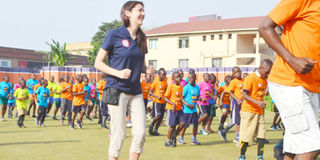Jill Valentine: the Canadian volunteer changing disability sport in Uganda

Jill Valentine warms up with children at the 2019 Blaze Sports inclusive sports gala at Lugogo. PHOTO BY ABDUL-NASSER SSEMUGABI
KAMPALA- Jill Valentine flew back home last Saturday, hoping to reach in time and catch Game Five of the NBA. Her home team, the Toronto Raptors, lost 105-106, but she hopes they bounce back, beat defending champions the Golden State Warriors and grab their first-ever national championship.
That is just one of her dreams, though. She also dreams that every Ugandan child with a disability gets a chance to play sport, as a way of changing perceptions and forge a better future.
Since 2017 Jill has been the lead facilitator of the Blaze Sports International’s Sports for Youth with Disabilities Initiative in Kampala and Gulu. But her experience of disability in Uganda spans eight years.
“I came here in 2011 with then my boyfriend, now my husband, and I came as a volunteer for the Kids League,” recalls the recreational therapist. “I knew Uganda was in its earliest phases of Paralympic development and I wanted to use my disability sport background to help.”
“I knew that the Kampala Kids League had started an adaptive sports league. So I came as their development manager for one year.”
Jill trained some trainers, facilitators and coaches and helped in many more other ways.
She speaks fondly of Willis Muwanguzi, a teacher at Kampala School for the Physically Handicapped, who was also the Adaptive League coordinator. Muwanguzi returns the favour: “Jill is someone committed to advocating for people with disabilities, wherever she goes.”
On what he learnt from her: “Where others said no, it’s impossible or useless, Jill said yes, it’s possible and useful to give children with disability a sporting chance.”
Often the duo organised inclusive sports galas for children with and without disabilities.
It was then that Jill also met Bumali Mpindi, the Uganda Paralympic Committee president. “I started helping with consulting with them.”
She also met people from Uganda Society of Disabled Children (USDC) Uganda National Action on Physical Disability (UNAPD) and other disability organisations.
The impact
By then, she recalls, the Kids League was doing various adaptive sports with schools like (KSPH), Ntinda School for the Blind. As nondisabled children played football every weekend, they also mixed with those with disabilities who played boccia, goalball, etc.
That was already an inclusive environment, but more needed to be done. “Over time, I discovered that all stakeholders [in the disability fraternity] would benefit more by coming together and knowing what each other was doing. That’s why I organised the National Disability Sports Summit in 2012,” she said.
The idea was to come up with a bit of a national plan to address the challenges.
Jill calls the summit a breakthrough. Representatives from the International Paralympic Committee and Motivation UK, the two major donors to para-sport worldwide, attended.
“We discussed the state of disability sport in Uganda, the strengths and weaknesses and the gaps, you know…and paved the way to start moving forward.”
Seven years on, Jill sees some fruits of her struggle: “I know Willis is doing a lot with KSPH and more schools are also emphasising adaptive sports programs, which I don’t think they were doing before when I came here.
“More trainers and the teachers are very aware of the adaptive sports….and are making sure they are adapting sports for handicapped children in their schools.”
Inside the refugee camp
After the landmark summit, Jill returned home. She volunteered in Philippines, after the Typhoon Haiyan in 2013, in Tanzania and in Puerto Rico in different fields. She continued disability work in Canada. “But it wasn’t as fulfilling in Canada as it is in Uganda. There are so many people with disabilities in Uganda. But in Canada they’re very few so I wasn’t as motivated.”
Jill got married, gave birth to her [first] daughter.
Recently, she and her husband returned to Uganda with and helped giving refugees in Moyo a new hope for a better life.
She tells tales of a visually impaired refugee, who used to collect mangoes and sell them in South Sudanese but cannot do the same in a refugee camp. Others depended on sewing machines but can no longer employ their skills because they do not have the sewing machines.
Last week, before winding up the Blaze Sport project in Kampala, Jill opened up a centre in the refugee camp in Moyo, where refugees with disabilities can converge, work together and share ideas.
“We gave sewing machines to some and will distribute more to other camps.”
The launch was also marked by a sports gala and Jill thinks “It’s a big step to make them feel that someone really cares and that they have a chance to really do something.”
In 2010, a group of handicapped refugees in Kenya formed a wheelchair basketball team. When they returned to South Sudan they formed the national wheelchair basketball team. “That’s my vision,” Jill said.
“The first time I came to Uganda I saved money to volunteer. I was renting an apartment, I moved into my sister’s basement so I wouldn’t have to pay rent. I had to pay for my flight.”
It takes a lot, she admits, but she says it’s worth it.
Worth giving every child with disability a sporting chance. Worthy helping fellow mankind.
Jill’s profile
First trip to Uganda: 2011
Residence: Toronto, Canada
Profession: Recreational therapist
Countries served: Tanzania, Puerto
Rico, Philippines
Landmarks: First Disability Sports
Summit in Uganda, 2012; Centre for the
disabled Refugees in Moyo, 2019




